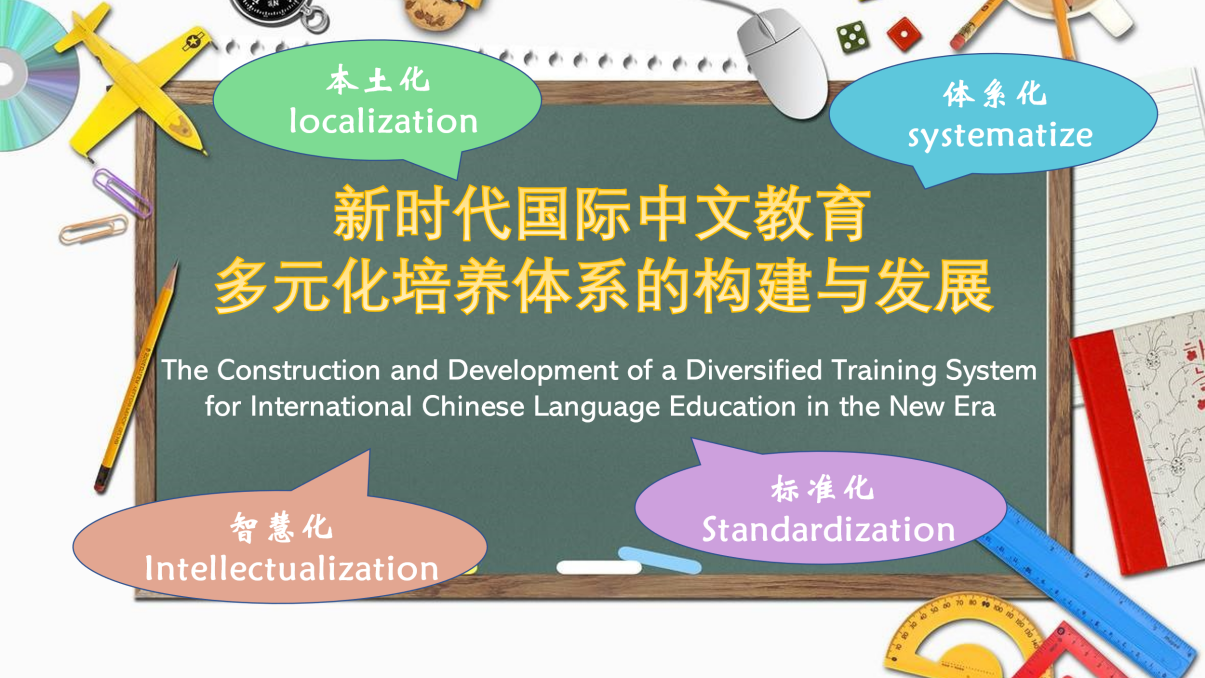
时间:2022年11月20日(星期日)
Date:Sunday, November 20,2022
地点:best365网页版登录(线下)+网络直播(线上)
Venue:School of Overseas Education, Sichuan University (offline) + live streaming (online)
主办方:教育部中外语言交流合作中心
承办方:best365网页版登录
四川大学国际合作与交流处留学生管理办公室
四川大学文学与新闻学院
Organizers:
Center for Language Education and Cooperation
Co-organizers:
School of Overseas Education, Sichuan University
Overseas Students Office, Sichuan University
School of Literature and Journalism, Sichuan University
一、工作坊主题Theme of the Workshop
新时代国际中文教育多元化培养体系的构建与发展
The Construction and Development of a Diversified Training System for International Chinese Language Education in the New Era
当今世界正经历百年未有之大变局,国际中文教育处在转型升级的关键时期,为进一步呼应国家在“推动中华文化走出去、增强国家软实力”方面的战略需求,国际中文教育要承担起促进中外语言交流合作、世界多元文化互学互鉴的重要职能,在教育理念、发展方式、工作重心、人才培养等方面做出相应转变以实现可持续发展的长远目标。基于此,best365网页版登录、四川大学文学与新闻学院、四川大学国际合作与交流处留学生管理办公室在教育部中外语言交流合作中心的大力支持下,拟定于2022年11月20日举办“新汉学计划”国际中文教育专题工作坊,诚邀海内外优秀硕、博士生参与研讨。
The world is now experiencing the unprecedented change in a century, and international Chinese language education is in a critical period of transformation and upgrading. In order to further respond to the strategic needs of the country in“promoting Chinese culture to go global and enhancing the national soft power”, international Chinese language education should take up the important function of promoting Chinese and foreign language exchange and cooperation and increasing mutual learning and appreciation of the world's diverse cultures.Corresponding changes are also needed in educationconcepts, development methods,workfocus andpersonnel training toachieve the long-term goal of sustainable development. In view of this, with the strong support of Center for Language Education and Cooperation, wesincerely invite master's and doctoral students at home and abroad to participate in a workshop entitled“CSP Doctoral Workshop”taking place both online and offline on Saturday,November 20, 2022.
本工作坊旨在服务海外汉学研究、实现国际中文教育交流互鉴,聚焦目前国际中文教育面临的挑战和未来的发展方向,为国际中文教育理论构建、文化交流、资源共享、人才培养、信息技术发展等方面的研究搭建专业学术交流平台,从多维的角度、融合的路径开展相关问题的专题探讨,以此推动新时代国际中文教育多元化培养体系的构建与发展,为国际中文教育事业的内涵式发展增值扩容、提质增效。
This workshop aims to serve overseas sinology research and achieve international Chinese language education exchange and mutual learning, focusing on the current challenges and future development direction of international Chinese language education. It also helps to build a professional academic exchange platform for research on international Chinese language education theoretical construction, cultural exchange, resource sharing, personnel training, information technology development, etc. and conduct thematic discussions on related issues from a multi-dimensional perspective and integrated path. It will promote the construction and development of a diversified training system for international Chinese language education in the new era, adding value and quality to the connotative development of international Chinese language education.

投稿文章议题包括但不限于:
We strongly encourage papers in the following topics but is not limited to:
模块一中外语言文化和教育的比较研究
Module 1 Comparative Research on Chinese and Foreign Languages, Cultures and Education
模块目标:开展面向国际中文教育的中外语言文化和教育对比研究,构建相关理论体系、方法体系和应用体系,有助于总结不同国别及地区的语言文化特点,为解决不同国别及地区中文学习者共性问题提供参考,为国别化、语别化的中文教材编写和教学实践提供精准服务;对比分析不同国家、地区语言教育的办学机制、教学模式和教育理念等内容,为国际中文教育提供可资借鉴的模式。
Goals:
(1)Construct the relevant theoretical system, methodological system and application system;
(2)Summarize the linguistic and cultural characteristics of different countries and regions;
(3)Provide a reference for solving common problems of Chinese learners in different countries and regions;
(4)Provide precise services for nationalized and language-specific Chinese textbook development and teaching practice;
(5)Provide models for international Chineselanguageeducation by comparing and analyzing the school-running mechanism, teaching mode and educational concept in different countries and regions.
模块研讨方向:
(1)中外语言与文化差异研究
(2)第二语言教学与跨文化交际
(3)中外语言教育政策的比较研究
(4)中外硕、博士培养模式的比较研究
(5)中外语言教育交流与合作研究
(6)中外文化交流与互鉴研究
Seminar Directions:
(1)Research on the differences between Chinese and Foreign Languages and Cultures
(2)Second Language Teaching and Intercultural Communication
(3)Comparative Research on Chinese and Foreign Language Education Policies
(4)Comparative Research on Chinese and Foreign Master's and Doctoral Training Models
(5)Research on the Communication and Cooperation of Chinese and foreign Language Education
(6)Research on Cultural Exchange and Mutual Appreciation between China and Foreign Countries
模块二海外中文教育本土化建设研究
Module 2 Research on the Localization of Overseas Chinese Language Education
模块目标:开展海外本土中文教学与习得研究,在丰富汉语教材、优化教学方法、编制教学大纲等方面加强中外合作交流,提升师资、教材和课程等教学资源的本土适应性,助力国际中文教育事业实现从外部“输血”到本土“造血”的转变,推动汉语进入海外国民教育体系、提升汉语的国际竞争力。
Goals:
(1)Strengthen Sino-foreign cooperation and exchange in enriching Chinese textbooks, optimizing teaching methods, and preparing syllabus;
(2)Improve the local adaptability of teaching resources such as teachers, textbooks and courses;
(3)Help international Chinese language education to transform from external "blood transfusion" to local "blood creation";
(4)Promote the entry of Chinese into the overseas national education system and enhance the international competitiveness of Chinese.
模块研讨方向:
(1)海外本土中文教育人才培养体系研究
(2)海外本土中文教材与其他教学资源的研究
(3)海外本土中文课程设置研究
(4)海外本土中文教育办学模式研究
Seminar Directions:
(1) Research on the Talent Cultivation System of Overseas Local Chinese Language Education
(2) Research on Overseas Local Chinese textbooks and Other Teaching Resources
(3) Research onthe Curriculum of Overseas Local Chinese Language Education
(4) Research on the School - running Model of Overseas Local Chinese Language Education
模块三国际中文教育数字化转型研究
Module 3 Research on digital transformation of International Chinese Language Education
模块目标:在百年大变局及新冠疫情的交互影响下,5G通讯、大数据、人工智能等高新技术的蓬勃发展重塑了国际中文教育生态。面对国际中文教育数字化、智能化转型趋势,从提升教师信息化素养、研发数字化教学资源、创新在线教学模式和教学方法等方面开展研究,推动现代化信息技术赋能国际中文教育。
Goals:
(1)Reshape the international Chineselanguageeducation ecology with the booming development of 5G communication, big data, artificial intelligence and other high technologies.
(2)Promote modern information technology to empower international Chineselanguageeducation in the research on improving teachers' information literacy, developing digital teaching resources, innovating online teaching models and teaching methods.
模块研讨方向:
(1)国际中文教育内涵建设和数字化转型研究
(2)人工智能在国际中文教学中的应用
(3)数字技术在国际中文教育管理中的应用
(4)国际中文教育数字化资源的开发与利用
Seminar Directions:
(1) Research on Connotation Construction and Digital transformation of International ChineseLanguageEducation
(2) The Application of artificial intelligence in International Chinese language Teaching
(3) The Application of digital technology in international ChineseLanguage Education Administration
(4) Development and Utilization of Digital Resources in International Chinese Language Education
模块四其他国际中文教育相关的议题
Module 4 Other issues related to International Chinese Language Education
除上述三类议题外,本工作坊也欢迎海内外学者就其他与国际中文教育相关的议题进行探讨,如面向国际中文教育的语言本体研究、国际中文教育发展与评价研究、国际中文教育标准与等级大纲研究、汉语国际传播的区域与国别研究等议题。
In addition to the above three categories of topics, the workshop also welcomes scholars from home and abroad to discuss other topics related to international Chinese language education, such as language ontology for international Chinese language education, the Development and Evaluation of International ChineseLanguageEducation, International ChineseLanguageEducation Standards and Level Syllabus, the Regions and Countries of International Communication of Chinese, etc.
我们诚挚期待各位学界同仁,围绕以上议题惠赐佳作,希冀能够从理论创新、规划实践、未来展望等不同维度,为国际中文教育多元化培养体系的构建与发展提供理论指导和实践依据,全面推进国际中文教育的转型升级和内涵提升,进一步巩固现有的中文国际传播成果,助力中文成为世界公共产品,从而更好地服务社会需求和国家战略。
Wearesincerely lookingforward to your contributions on the above topics. We hope that they will provide theoretical guidance and practical basis for the constructionand development of a diversified training system for international Chinese language education from different dimensions, such as theoretical innovation, planning and practice, and future prospect.We also hope that they will comprehensively promote the transformation, upgrading and internal improvement of international Chinese language education, and further consolidate the existing achievements in international Chinese language communication, and help Chinese become a global public product, thus better serving social needs and national strategies.
二、工作坊形式与时间Format and Time of the Workshop
1.工作坊形式:本次工作坊将采用线上与线下相结合的方式举办(具体安排视疫情防控形势而定),所有活动将进行网络直播。
本次工作坊包括但不限于以下环节:
(1)优秀学术论文分享与讨论
(2)海内外优秀硕、博士生分享国际中文教育实践经历
(3)国内外相关领域的知名专家学者及期刊编辑参与讨论、分享与点评
The format of the workshop will be blended with both face-to-face and virtual options.
The activities during the workshop include:
(1) Sharing and discussing the excellent academic papers
(2) Sharing educational experience by outstanding Master's and doctoral students from home and abroad
(3) Discussion session joined by reviewers, scholars and journal editors in related fields at home and abroad
2.工作坊时间:2022年11月20日
3.工作坊地点:best365网页版登录(线下)+网络直播(腾讯会议:153-293-539)

4.参会费用:本次工作坊不收取任何会务费用。承办方将为现场参会者提供午餐,往返交通费、住宿费用自理。
The workshop is scheduled to be held at the School of Overseas Education, Sichuan University on November 20, 2022. We will disseminate information about the online options as we get closer to the event.
No fees will be charged for conference participants. Free lunch will be available for presenting doctoral students who attend the workshop physically.
三、评选说明Information on Research Prizes
本次工作坊将邀请相关领域的专家组成学术委员会,对投稿文章进行双向匿名评审,从中选出6篇优秀论文,并发放获奖证书予以鼓励。参评论文将择优推荐高质量学术刊物发表,获奖论文名单请等待后续通知。
奖项设置:
⟡ 一等奖1名
⟡ 二等奖2名
⟡ 三等奖3名
The workshop organizing committee will invite renowned scholars to form an academic committee to review and select6excellent papers from the submitted papers through double-blinded review. The authors of those6excellent papers will receive research awards according to their ratings of the academic committee.We will also recommend excellent papers to high-quality academic journals for publication. Please wait for the following notice for the list of winning papers.
Research awards:
⟡ One first prize
⟡ Two second prizes
⟡ Three third prizes
四、工作坊投稿要求Requirements on the Submission to the Workshop
参会者可为海内外院校的在读硕、博士生,参会者需提交论文全文(不限字数)或论文概要(200—500为宜),论文应为未公开发表的原创文章。论文文件请以“题目+姓名+专业+联系方式”进行命名,论文格式请参照附件1《论文投稿格式》(中文投稿最好不超过一万字),投稿截止日期为2022年10月30日,投稿成功者将在一周内收到邮件确认。
投稿方式:https://www.wjx.cn/vm/tk2qRSd.aspx#

The participants should be master's and doctoral students in domestic and overseas universities. Participants are required to submit full papers (unlimited words) or abstracts (200-500 is appropriate). The workshop accepts unpublished and original articles.The file should be named as "title+name+major+contact information". Article should not normally exceed 10,000 words (excluding footnotes). Please refer to the submission guidelines of Appendix 1 "Paper Submission Format" for format requirement.The deadline for submission is October 30, 2022, and the successful submission will receive an email confirmation within one week.
We prefer to receive submissions as attachments in PDF or Word document format via the link (https://www.wjx.cn/vm/tk2qRSd.aspx).
五、联系方式Contact Information
如有任何关于投稿或参会相关的疑问,请发送邮件至xinhanxue2022@163.com。
If you are having any difficulties in submitting your article or any questions related to the workshop, please contact xinhanxue2022@163.com.
附件1:
论文投稿格式
1.字数:论文以5,000—10,000字为宜。
2.题目、提要和关键词:文章题目、提要、关键词请提供中英文,关键词不超过5个,中文论文的中文提要和英文提要不超过300字;英文论文的中文提要300—500字,英文提要300字(英文都使用Times New Roman字体,关键词之间用分号隔开)。
3.基金项目:若为基金项目,标题右上角加*,脚注于页下,脚注内容为基金项目名称及编号。
4.内容注意事项:稿件语言文字、标点符号应规范,无错别字、病句;数字、计量单位用法符合规定并保持一致;引文、数据经过核对,注明出处和参考文献(文章凡有引用内容,请务必进行标注:正文引用处以(作者,年份)格式标注,文后以参考文献形式再次标注);全文体例格式应保持一致。
5.各级标题:全文各级标题格式统一。各级标题全部顶格排。
6.正文:
(1)字号、字体:正文采用小四号字;汉字用宋体,数字和英文(包括缩写字母)使用Times New Roman字体。
(2)标点:中文行文中使用中文标点,英文行文中使用英文标点。尤其需注意中英文引号、逗号、冒号的区别。
(3)引文:大段引文用楷体并另起一段(其中的数字和英文仍用Times New Roman字体);引文、数据应来自权威资料或网站,并注明出处和参考文献。
(4)图表:全文图和表分别统一编号(即:图1、图2,表1、表2……)。表格编号及名称置于表格上方中间,图片(包括统计图)编号及名称则置于图片下方中间。表格内数据需精准无误,如有四舍五入请在注释中加以说明。复杂的图请用绘图仪器绘制精确,确保清晰无误。
7.作者简介:内容包括作者姓名、职称、工作单位、主要研究方向(中英文版均须提供)。内容置于正文之后。
8.附注:文章注释一律采用尾注,列于作者简介之前,用“1、2、3……”统一编号。字体与正文相同,字号为五号。第一条注释的前一行加楷体加粗的“附注”二字。
9.参考文献:参考文献列于附注之后。先中文文献后日文、西文文献,每个语种按作者姓名音序排列。字体要求与正文相同,字号为五号字。第一条参考文献的前一行加楷体加粗的“参考文献”四字。参考文献的要素请尽可能提供。参考文献的著录格式参考《信息与文献参考文献著录规则》GB 2015版。(下载链接:http://cbimg.cnki.net/Editor/2019/0910/gzzy/10259773-6f88-471f-a1a3-a7d394eac889.pdf)。